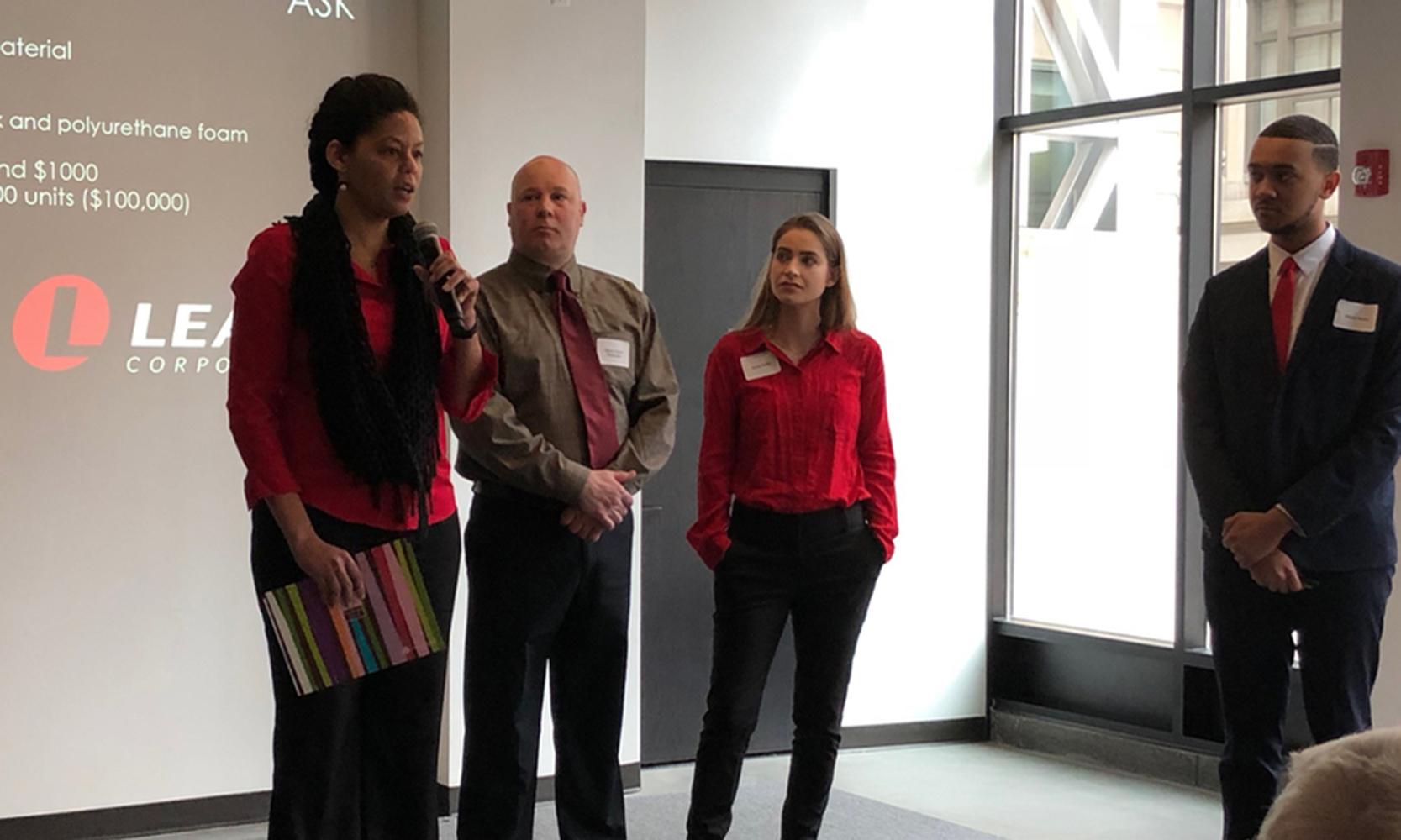
Every team member has an important role in innovative thinking. And through an internship opportunity, Jenelle Newman learned more about hers.
Working in a highly-stylized create environment with artistic expression on the walls, flexible-use furniture, and gaming spaces—all designed to foster a collaboration and idea generation at Lear Corp.’s Detroit Innovation Center — Newman uses her strong attention to detail and research-based thinking to help the student-based team invent a new automotive and vehicle safety product for the Fortune 500 company.
Newman, who studied graduate-level information systems and technology, has worked in Lear’s E-Systems division since May. She said she’s connected with field experts, met people from all around the world, and even had a chance to speak with Lear’s International CEO Ray Scott.
“I’ve worked in several places, but never like this. When I read the College of Engineering and Computer Science Dean’s Office email letting me know about this opportunity, I had no idea that it could lead to where I am today,” she said. “These experts are giving me their time. I am learning so much about the technology that’s out there now and what’s on the horizon.”
But it was her first experience with Lear—the Lear Open Innovation Challenge—that taught her how to best utilize her talents in a team setting. The event, which took place during the winter semester, educated Newman more about her personal and professional strengths. It also showed her the importance of interdisciplinary skills on a team.
Her five-member Lear Open Innovation Challenge team—assembled based on the diversity of strengths and skills—took first place for their idea and each won a Lear summer internship position, a cash prize and more. The challenge is an annual open tournament for university students to propose solutions to a business challenge chosen by Lear. Five Michigan colleges participated this year, with UM-Dearborn having the highest number of attendees.
Newman, who graduated with her College of Engineering and Computer Science master’s degree in April, said she’s always been fascinated by technology and the benefits it has for the user. She remembers the awe she felt when using the computer as a child.
“It was absolute magic to me. That drive to better understand how it all works is why I wanted a degree in information technology,” said Newman, “In an industry that changes so fast, I also want to help continue to move technology forward through improving what is out there and coming up with new ideas. It’s also about discovering what could be next.”
Although ideation is typically what first comes to mind when people think of “what’s next,” Newman’s focus to detail, timeline and push for incremental improvement is a vital part of the innovation process, said College of Business Reference Librarian Joan Martin.
Martin, who has helped mentor students and connect them to resources during the Lear Open Innovation Challenge, said a diversity of styles—Lear’s competition uses an Innovation Code-based assessment developed by Ann Arbor’s Innovatrium, in which Newman is categorized as the technically minded “engineer”—is needed to push innovative thinking forward.
“The method they teach at the Innovation Challenge utilizes strengths on your team to the maximum; it’s a mixture of personality and function,” she said. “Artists and visionaries are wonderful, but their ideas can only come to fruition with research, communication and planning. That is where other skill sets come into play. Even if you have the most creative ideas, if you miss deadline and go over budget, your idea won’t fly in corporate America.”
Newman said her team is giving their all to make sure their idea —a vehicle safety feature created through a bioengineering perspective—does succeed.
Regional Lear Innovation Manager Leia Spagnuolo said although the students have such different skill sets, backgrounds and thought processes, they collaborate very well together. And she said Lear has been impressed with their work.
“The students have a positive impact on Lear by bringing a new level of energy, fresh perspectives and additional resources to progress innovation challenges that Lear faces today.”
The student team plans to deliver an update and prototype to Lear stakeholders in August.
“I believe our team won because the idea we pitched at the challenge was so radical and different, but also backed by research and spec sheets. It’s not only out-of-the-box, it’s also possible,” said Newman, who can’t give too many details of the team’s work-in-progress due to confidentiality reasons. “I’ve learned that nearly anything is achievable if you are on the right team and you are able to focus on what you are good at and allow others to focus on areas where they excel.
“Through Lear, we’ve have this opportunity to learn how to best work together so we could and make our idea a reality.”



